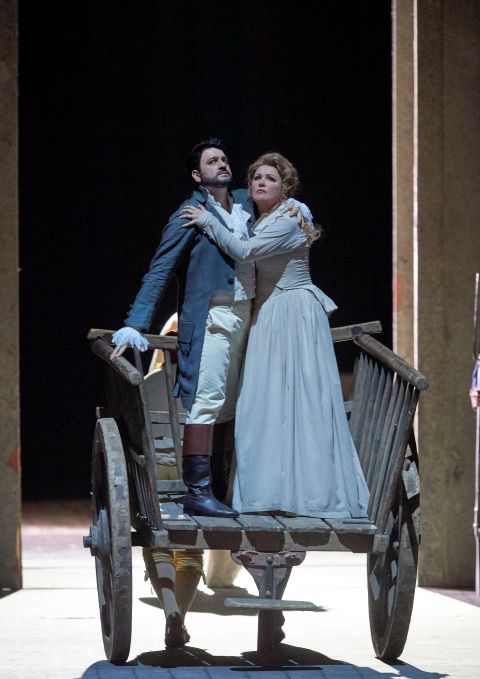 Austria Giordano, Andrea Chénier: Soloists, Chorus and Orchestra of the Wiener Staatsoper / Marco Armiliato (conductor), Wiener Staatsoper, Vienna, 31.5.2019. (JMI)
Austria Giordano, Andrea Chénier: Soloists, Chorus and Orchestra of the Wiener Staatsoper / Marco Armiliato (conductor), Wiener Staatsoper, Vienna, 31.5.2019. (JMI)

(c) Wiener Staatsoper/Michael Poehn
Production:
Director – Otto Schenk
Sets – Rolf Glittenberg
Costumes – Milena Canonero
Cast:
Andrea Chénier – Yusif Eyvazov
Maddalena – Anna Netrebko
Carlo Gérard – George Petean
Bersi – Margaret Plummer
Madelon – Monika Bohinec
The Incredible – Carlos Osuna
La comtesse di Coigny – Donna Ellen
Roucher – Orhan Yildiz
Fléville – Manuel Walser
The Abbé – Peter Jelosits
Mathieu – Wolfgang Bankl
Schmidt – Ayk Martirossian
There is a Latin saying that could apply to this performance of Andrea Chénier – the well-known ‘Post festum, pestum’ – though I recognize that its application here may be somewhat exaggerated. Without question, Die Frau ohne Schatten the day before was a musical feast, and I dare not say that this Andrea Chénier was a pest, but there was a big difference. To begin with, the level of quality between the operas is more than remarkable; and then one went from the exceptional performance of the former to a more or less average evening at the latter. Neither the staging nor the music were convincing on this second night, while the vocalists on the whole were somewhat irregular.
Marco Armiliato is a very able conductor and one preferred by the great figures in opera. It is therefore not surprising that with Anna Netrebko in the cast, Armiliato was in the pit. The same thing happened here a few months ago, when the stars of this opera were Jonas Kaufmann and Anja Harteros. This time his conducting fell below the level of other occasions, and he led a more or less routine version, especially in the first two acts. The orchestra was good but seemed a shadow of itself compared to the previous day in Strauss.
The great attraction of this Andrea Chénier was the presence of the quintessential diva of recent years, soprano Anna Netrebko, in the character of Maddalena di Coigny. She was brilliant in a part that is actually rather comfortable: it requires just two duets with the protagonist and the famous aria ‘La mamma morta’ in Act III. I have had the good fortune to hear the best three Maddelenas in the contemporary opera world – Harteros, Netrebko and Radvanovsky – and all three have been very good, but I prefer Radvanovsky when it comes to transmitting emotions.
The part of the poet Andrea Chénier was sung by Yusif Eyvazov, whose presence in this cast does not need to be explained. Obviously, if it were not for his relationship with Anna Netrebko, his artistic career would be very different from what it is. His voice has amplitude and is well suited for this type of opera, and he has remarkable control of his breathing. But the quality of his timbre leaves something to be desired, and there are artificial sounds in the lower notes and a narrowing at the top. I liked him in the last act, both in the courtroom and in the prison.
Carlo Gérard was played by baritone George Petean, who replaced Marco Vratogna (whose contract appears to have been canceled due to his late arrival at rehearsals). I think we were ahead with this change – Petean is not perfect but his voice has amplitude and quality and is well-suited for the role. His singing can become rather monotonous, however, since everything is in forte.
In the secondary characters I should mention a fine job by Monika Bohinec as Madelon (we are accustomed to listening to former glories in decline sing this part). Bersi, interpreted by Margaret Plummer, was correct, as was Donna Ellen’s countess. The Roucher of Orhan Yildiz was a little short on volume, but Wolfgang Bankl as Mathieu did well, as did tenor Carlos Osuna as The Incredible. Ayk Martirossian was a sonorous Schmidt.
The staging by Otto Schenk premiered here in 1981 and has been performed 119 times. This opera does not allow directors any concessions: the libretto marks exactly where and when the actions take place. With Otto Schenk we are in the realm of the purest classicism, although his production in this case seems antiquated and much less interesting than his other works from the same period such as Der Rosenkavalier. The sets are rather simple: painted curtains for Act I and in the next two acts a sort of square with windows in the background that serves for the center of Paris, the courtroom and the prison scene. Time has passed for this production.
The Staatsoper was sold out, and the audience gave a warm reception to the artists, with the biggest ovations for Anna Netrebko, as one might expect.
José M. Irurzun
